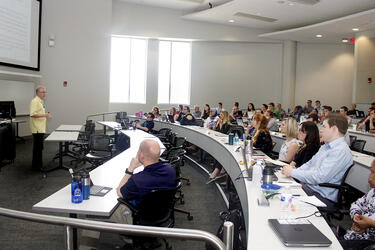Wright State hosts ERP Boot Camp
Local researchers attend to learn about Event-related potentials (ERP)
June 14, 2018

June 14, 2018
June 12 - 14, Wright State University hosted a Boot Camp on Event-related potentials (ERP). ERP is a form of electroencephalography (EEG) that is measured as a function of specific mental events – perceptual, cognitive, or motor. ERPs are a very useful tool to study human cognition. They are non-invasive, have a very high temporal resolution, and they can be use to pinpoint specific mental processes. ERPs are widely used as neurophysiological markers of perceptual and cognitive processes.
The 3-day boot camp was led by Steve Luck, PhD, Director of the Center for Mind and Brain, and professor
Finding the right college means finding the right fit. See all that the College of Science and Math has to offer by visiting campus.